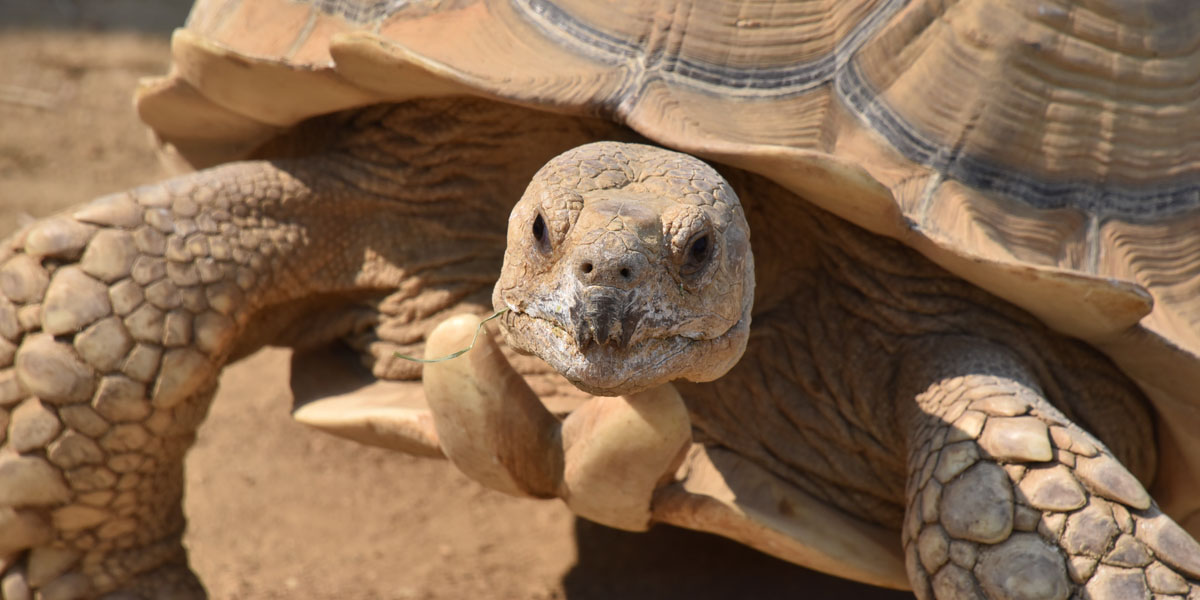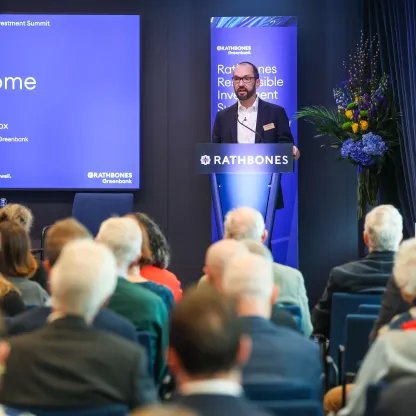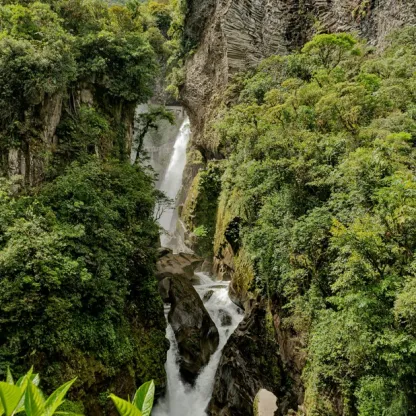With the annual Durrell Lecture returning to London’s Royal Institution for the first time since the pandemic, it seemed fitting that the evening’s theme – “Tortoise Tales” – should highlight the trials facing such an extraordinary and vital animal but also celebrate the return of some of the most endangered species to their native habitats.

Durrell Lecture 2023: Tortoise Tales
Article last updated 20 November 2023.
Watch a recording of the Durrell Lecture at the end of this article.
Tortoises are proven ecological engineers, with grazing and burrowing habitats that support the wider needs of indigenous biodiversity and accelerate the regeneration of failing ecosystems.
Decimated over time by hunters, traders in medicinal oils and the introduction of invasive species, tortoise numbers today are threatened by a lucrative trafficking network servicing an international demand for rare and endangered animals.
Durrell Wildlife Conservation Trust CEO, Dr Lesley Dickie, highlighted the ancient and widespread reference to tortoises in human culture and moral symbolism. The Cosmic Turtle is a mythological narrative common to Eastern and Western mythologies, depicting the tortoise as either the stoic bearer or container of the world. Our continuing fascination with tortoises and other chelonians is reflected in the number we currently keep as pets, with over a million living in UK households alone.
However, global numbers are falling due to habitat loss, invasive species, climate change, and illegal trade – more than half of all chelonians are threatened with extinction. One critically endangered species is the angonoka or ploughshare tortoise which may be functionally extinct in the wild due to its lengthy breeding cycle. The high commercial value of ploughshares to wildlife traffickers is increasing that extinction threat.
The famed longevity of tortoises provides a sobering context to their ongoing struggle for survival. The oldest-known living land animal is a Seychelles giant tortoise called Jonathan who hatched in 1832. The global population since then has grown from 1 billion to over 8 billion people, exponentially increasing the pressures on natural resources. Jonathan has also witnessed the extinction of many species which were abundant in his lifetime, proving just how quickly irreversible losses can occur.
Durrell works to ensure that Jonathan and others like him are remembered for their lasting importance to the natural world, not for being the last of their kind.
In Madagascar, however, ploughshare tortoises and other chelonians are threatened by traffickers exploiting impoverished communities to facilitate the illegal trade in rare animals. Former Metropolitan Police officer and organised crime specialist Christian Plowman has worked alongside Durrell in Madagascar since 2018, training multiple Malagasy agencies to identify and limit the impacts of traffickers and their associates.
The uniqueness of environment, geography and culture in Madagascar presents significant challenges to anti-trafficking efforts. The species under threat are also unique to anywhere else where anti-trafficking methods have been developed and refined. Impoverished Malagasy farmers are often employed to locate and steal endangered animals for local ‘fixers’ because of their knowledge of the native bush – a $50 payment for complicity can be over three times the average farmer’s monthly wage. Further along the trafficking chain, the fixer passes on the stolen animal to a contact tasked with transporting it off the island. The animal is then transported by air to a Middle Eastern seller who transfers it to their buyer.
A young ploughshare weighing roughly a kilogram costs more to buy in this market than its weight in cocaine – around $50,000.
The relative benefits to all parties in the trafficking chain makes the theft and transportation of endangered species in Madagascar a common occurrence that’s difficult to track or contain. Security forces nevertheless work hard to stop the trade and significant seizures have been made over the years. Between 2000 and 2015, Malagasy authorities prevented the transportation of nearly 8,000 tortoises – recovered ploughshares alone equated to around $7.3 million of illegal business.
For James Gotts – Durrell’s Team Leader of invertebrates and chelonians – the extraordinary evolution and regenerative capacity of tortoises is a story 250 million years in the making. Throughout such a prolonged lineage, tortoises have developed a unique and mutually beneficial relationship with their native habitats. They can survive for months without food or water, and many can hibernate through weather extremes and absorb nutrients in biologically unique and ingenious ways. Their extreme longevity and breeding capacity are also attributed to millions of years of genetic adaptation.
However, while Aldabra giant tortoises have been in captivity for almost 100 years, their husbandry is still a predominantly experimental science. The development of optimal diets and temperature conditions are still largely ongoing and breeding in European zoos has been extremely rare. Durrell’s work with its European partners therefore looks to create a best-practice blueprint for understanding Aldabra tortoises and increasing breeding successes.
Some estimates suggest giant tortoises have existed in the Indian Ocean for around 40 million years and have been the driving force behind the evolutionary progress of islands in the region. Having worked on island restoration projects in Mauritius since the 1970s, Durrell introduced Aldabra and radiated tortoises to their long-running Round Island project in 2007. It quickly became apparent that the tortoises’ grazing patterns were clearing away invasive grasses and allowing previously dormant native seeds to germinate and flourish. Along with the manual planting of over 37000 native plants the effect of the tortoise' presence on Round Island was transformative and life and growth returned to a denuded and dying ecosystem. Having begun the introduction experiment with 24 tortoises, there are now over 800 Aldabras on the island, continuing to successfully breed and benefit their natural habitat.
Conservation challenges can sometimes seem insurmountable: global biodiversity loss continues to pressurise struggling ecosystems and wildlife trafficking is a multi-billion-dollar business. Durrell and conservationists like them have nevertheless proved over the years that even small successes can yield big results.
Rather than give in to the threats facing the natural world, we must all continue to foster and support optimism and constructive action – as the old proverb says: “it is better to light a candle than curse the darkness.”




